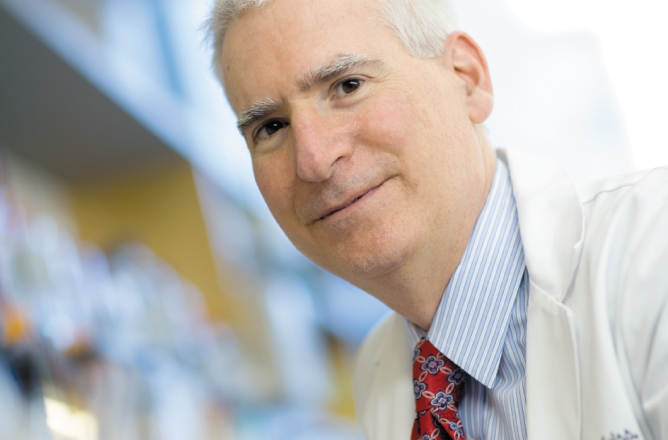Cleveland-Based Thermalin Gets Funding For Diabetes Research

Case Western Reserve University diabetes researcher Dr. Michael Weiss is determined to unlock the mysteries surrounding diabetes.
The company he co-founded, Cleveland-based Thermalin, Inc., uses cutting-edge science to alter the insulin molecule to treat diabetes. Weiss is a professor of biomedical engineering, biochemistry and medicine (endocrine) and director of the Institute for Therapeutic Protein Engineering at Case Western Reserve University.
Thermalin has entered into a collaboration with Sanofi, a multi-national pharmaceutical firm, to engineer new insulin analogues. The partnership between Thermalin and Sanofi, which could generate as much as $788 million, is one of the largest research and development commitments to next-generation insulin, Case said in a statement.
Weiss founded what was originally Thermalin Diabetes in 2007, and the company spun off from Case in 2009, said Michael Haag, executive director of technology management at Case Western Reserve. His office is responsible for the commercialization of technology developed at Case.
“Thermalin is hugely important,” Haag said, because its innovations aim to improve the quality of life for Type 1 and Type 2 diabetics.
Type 1 diabetes is an autoimmune disease that attacks specialized cells in the pancreas, making the body unable to produce insulin. Insulin allows the body to process sugar to create energy; without it, the body cannot process food.
In Type 2 diabetes, also called adult-onset or noninsulin-dependent diabetes, the body either resists the effects of insulin or doesn’t produce enough of the hormone to keep blood glucose levels at normal levels.
Both types of diabetes are chronic conditions. People with diabetes must have a constant supply of insulin through injections or an insulin pump, and carefully monitor their blood glucose levels several times a day.
“It’s really a 24/7 job for patients,” Weiss said. Failure to keep glucose levels under control can lead to a health emergency.
Thermalin is engineering new forms of insulin to make it easier for Type 1 and Type 2 diabetes to manage their health. Its pre-clinical programs include ultra-rapid-acting insulin, insulins that never need refrigeration, glucose-responsive insulin and a once-a-week insulin patch.
Currently, insulin becomes inactive at high temperatures and must be shipped in refrigerated trucks. Insulin that never needs refrigeration will be a boon to Third World countries where many villages lack electricity, Weiss said.
To test Thermalin’s proposed no-refrigeration insulin, Weiss heated insulin to 130 degrees and sloshed it in a test tube to simulate a person walking with the medicine for between 30 min. and five hours – which is how it might be handled by a villager walking home from a health clinic.
Ultra-rapid-acting insulin, which that can be absorbed quickly in the blood, is expected to transform the insulin market by 2019, according to the research and consulting firm GlobalData.
Ultra-rapid-acting insulin would mimic how insulin acts in healthy people, help diabetics avoid hypoglycemia and make automated insulin pumps safer and more effective, Weiss said.
Weiss is also working to develop glucose-responsive insulin (GRI), which would linger in the bloodstream, activate only when needed and lower the risk of hypoglycemia.
“It would be a tremendous revolutionary change,” Weiss said about GRI. “It’s really challenging. We don’t know how to do this yet.”
A stick-on insulin patch would hold hundreds of microneedles that detect glucose and release the right amount of insulin, thus eliminating injections, according to an explanation on the Junior Diabetes Research Foundation website. The patch is still under investigation at Case’s academic lab, Weiss said, but he expects it to be part of Thermalin’s research soon.
Over the past five year, Weiss has seen huge strides forward in the treatment of diabetes. The Cleveland-area native became fascinated with diabetes while he was a medical student doing an emergency room rotation at Brigham and Women’s Hospital in Boston. He saw a young diabetic man who, despondent over a failed romance, stopped taking insulin and landed in an emergency room. Injections of insulin and glucose saved his life.
“I saw a dramatic revival in someone hours away from death,” Weiss recalled. He leaves Case to become chairman of biochemistry and director of the center for chemical biology at Indiana University in December.
He has always thought about the future of medicine. He remembers watching the original “Star Trek” series on a black-and-white television with his Harvard University roommate and Thermalin co-founder Richard Berenson. Weiss identified with the ship’s medic, Dr. McCoy. “He was a very humane character,” Weiss said.
Weiss predicts that by the 23rd century — the time period when “Star Trek” takes place – Type 1 diabetes will be cured.
“No one will have it,” Weiss declared. “Type 2 is a bigger question.”
This story originally appeared on cleveland.com.